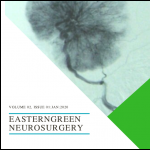Posterior Reversible Encephalopathy Syndrome During Term Pregnancy- Case Report
Keywords:
Hypertensive Encephalopathy, Pregnancy, Posterior reversible encephalopathy syndrome, SeizureAbstract
Posterior reversible encephalopathy syndrome (PRES) or reversible posterior leukoencephalopathy syndrome (RPLS) is a rare clinic-neuro-radiologically diagnosed disease in pregnant women. Other clinical conditions causing PRES include hypertensive encephalopathy, renal failure, autoimmune disorders and treatment with immunosuppressant or cytotoxic medications. Uncommon clinical conditions include acute intermittent porphyria and cryoglobulinemia. This syndrome is also known as reversible posterior cerebral oedema syndrome or posterior leukoencephalopathy syndrome. Clinical features include headache, encephalopathy, seizures, cortical visual disturbances or blindness and parieto-occipital white matter changes on neuroimaging. We report a 21-year-old primigravida who presented to us at term pregnancy with seizures, altered sensorium, and hypertension, which was later diagnosed to be PRES and was successfully managed.




